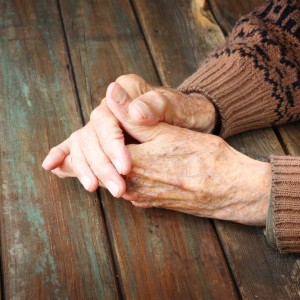
Today, people with learning disabilities are living longer than ever before. One consequence of this is that more people will require palliative care services and end-of-life care. Therefore there is a need to make sure services are tailored to meet the needs of people with learning disability.
Previous research has demonstrated the value of listening to the views of service users as they have direct experience of using healthcare services.
The current article describes a study carried out by McLaughlin and colleagues (2014). The study aimed to improve the way in which healthcare professionals are trained to deliver end of life care by collecting the views of people with a learning disability and family carers.
Methods
A total of seventeen adults with a learning disability and five family carers took part in the study. Adults with a learning disability took part in a group discussion, whereas family carers completed one-to-one interviews.
A pictorial approach was used in the group discussion, to aid understanding and to encourage conversation. The team showed the members of the group a picture of a lady named ‘Susan’, stated that Susan was ill and would eventually die. The team then asked a number of questions about Susan, including how she may feel, what information she may need and how she could be made to feel more comfortable.

People with learning disabilities are living longer, so we need to think about tailored palliative care services
Both the group discussions and the individual interviews were recorded and typed up onto a computer. The research team then read over the responses to look for themes amongst the answers the service users and family carers gave.
Results
The authors divide the participants’ responses into three themes. Each outlined a different learning need of healthcare professionals supporting people with end-of-life care.
Information and preparation
Both the adults with a learning disability and the family carers wanted healthcare professionals to be able to provide them with information about the illness in a format that they were able to understand. There was a discussion around the role of family carers in helping the person with a learning disability to understand their prognosis.
It was believed that receiving information about a service user’s prognosis would help family carers to become prepared, both psychologically to understand that their loved one may soon pass away. In addition, participants identified the need for information for more practical reasons, such as to deal with funeral arrangements.
Provision of care
Participants listed several places where they could receive care, including at home, a hospital and a care-home. However family carers noted that they would like their loved one to be cared for in an appropriate environment. For example, for young adults it would be important to be in an environment with service users of a similar age.
Both adults with a learning disability and family carers were also able to identify a number of professionals who could be involved in end-of-life care. This included a chaplain, a psychiatrist, social services and people to help with practical matters such as household chores, suggesting there is a need for holistic care.
This need for professional support was also extended to family carers, most frequently with reference to a trained counsellor or someone to help them deal with their loss.
Family-centred care
The personhood of the individual with a learning disability was identified as being of paramount importance.
Both parties talked about the need for the person to be surrounded by people that were familiar to them, that know them as a person and understand their behaviour and preferences. The authors note that this poses a dilemma as a move to end-of-life care services would result in meeting new, unfamiliar healthcare professionals.

The person needs to be surrounded by people familiar to them, which of course poses a difficulty if people need to move to new end-of-life care services
Conclusions
In conclusion, participants were able to identify three key training needs for healthcare professionals that are delivering palliative care to individuals with a learning disability. Both parties identified the need to receive information in a format that is accessible. In addition, individuals with a learning disability need someone familiar to them that understand them as a person.
Strengths and limitations
The research team took several steps to ensure that the adults that took part in the study were fully able to participate. Each participant was given an accessible leaflet and consent form that used straightforward language to describe the study and explain what participation would involve.
The use of ‘Susan’ to exemplify end-of-life care was particularly appropriate as previous research has shown that a pictorial approach is a valuable way of involving people with a learning disability in research projects (Gates & Weight, 2007).
The research team understood that discussing end of life care could be sensitive for participants. As a result they provided details of support services to everyone that took part in the research study.
The researchers note that despite efforts to recruit more family carers, only five took part in the study. This may be due to the sensitive topic of the research. A larger sample of family carers would enable the research team to gain a fuller, more comprehensive account of the views of family carers.
The large majority of participants were women, with twelve of the seventeen adults with a learning disability and four of the five family carers identifying as female. A more balanced sample would ensure the views of male service users and family carers are also represented.
Summary
The authors suggest several ways in which the findings of the study can be used to inform the training of healthcare professionals.
There are many existing resources available to provide people with a learning disability and family carers with information about end-of-life care. The authors note that in light of the current findings, more work should be done to increase awareness of these resources amongst healthcare professionals.
Participants highlighted the importance of being surrounded by familiar people. However the authors note that this poses a dilemma, as visits to end-of-life care services would result in meeting new, unfamiliar healthcare professionals. Therefore there is a need to look into the ways in which care can be delivered collaboratively with people who already support and are familiar with the service user.
The study demonstrates that people with a learning disability and family carers are able to talk about end-of-life care. Therefore it is important for healthcare professionals to acknowledge and respect the expertise that these two parties hold and to work in partnership with family members.
I was very interested (and pleased) to read about the ways in which the authors adapted the methods.
Looking at this as a researcher I can understand why they listed the theme about the need for information first. However, as a Support Worker I would have liked to see the theme around the service users person-hood (their likes, preferences etc) take more of a central role in the article.
I believe this would be most important, particularly during a time that can be confusing and stressful. Also, thinking about this with my support worker hat on, I wonder if these views would also represent people with more severe learning disabilities, or if their needs would be different.

People with a learning disability and family carers are able to talk about end-of-life care and healthcare professionals need to acknowledge and respect this expertise
Links
Primary paper
McLaughlin, D., Barr, O., McIlfatrick, S., & McConkey, R., (2014) Service user perspectives on palliative care and education for health and social care professionals supporting people with learning disabilities. BMJ Supportive & Palliative Care, 0, 1 [abstract]
Other references
Gates, B., & Waight, M., (2007). Reflection on conducting focus groups with people with learning disabilities. Theoretical and practical issues. Journal of Research in Nursing, 12, 111-126
Simons, L., Tee, S., Lathlem, J., et al. (2007) A socially inclusive approach to user participation in higher education. Journal of Advanced Nursing, 58, 246 – 255

@LearningDisElf http://t.co/jEqZLISrO7
People with learning disabilities are living longer, so we need to think about tailored palliative care services http://t.co/Lr9qeOWVHi
@LearningDisElf We need to think about this because mainstream services are not set up to cope with ppl with LD’s
@lastdaysoflife End-of-life care for people with learning disabilities. Views of service-users and family carers https://t.co/lhOjCUeoKb
Don’t miss: End-of-life care for people with learning disabilities. Views of service-users and family carers http://t.co/Lr9qeOWVHi #EBP
EOL care for people with LD. http://t.co/nLWgh9hAkp
End-of-life care for people with learning disabilities http://t.co/HTfSPnvHg8
“@Mark_Sheldon: End-of-life care for people w LD http://t.co/ti0sekcPwS via @LearningDisElf http://t.co/XlF4ROpGz8” @KirstyLiddiard1
RT @Mark_Sheldon: End-of-life care for people with learning disabilities http://t.co/WvU2kzObjF via @LearningDisElf http://t.co/LZIg10IhiX
There needs to be more training for health professionals re: end of life care for people with learning disabilities http://t.co/bNTF7lq06C
@kimmaddison End-of-life care for people with LD. Views of service-users and family carers https://t.co/DkIE0dh2Ih
Great to see people with learning disabilities included in such important research, end of life care obviously needs sensitive discussion and the review indicates this was tackled in an authentic and meaningful way.